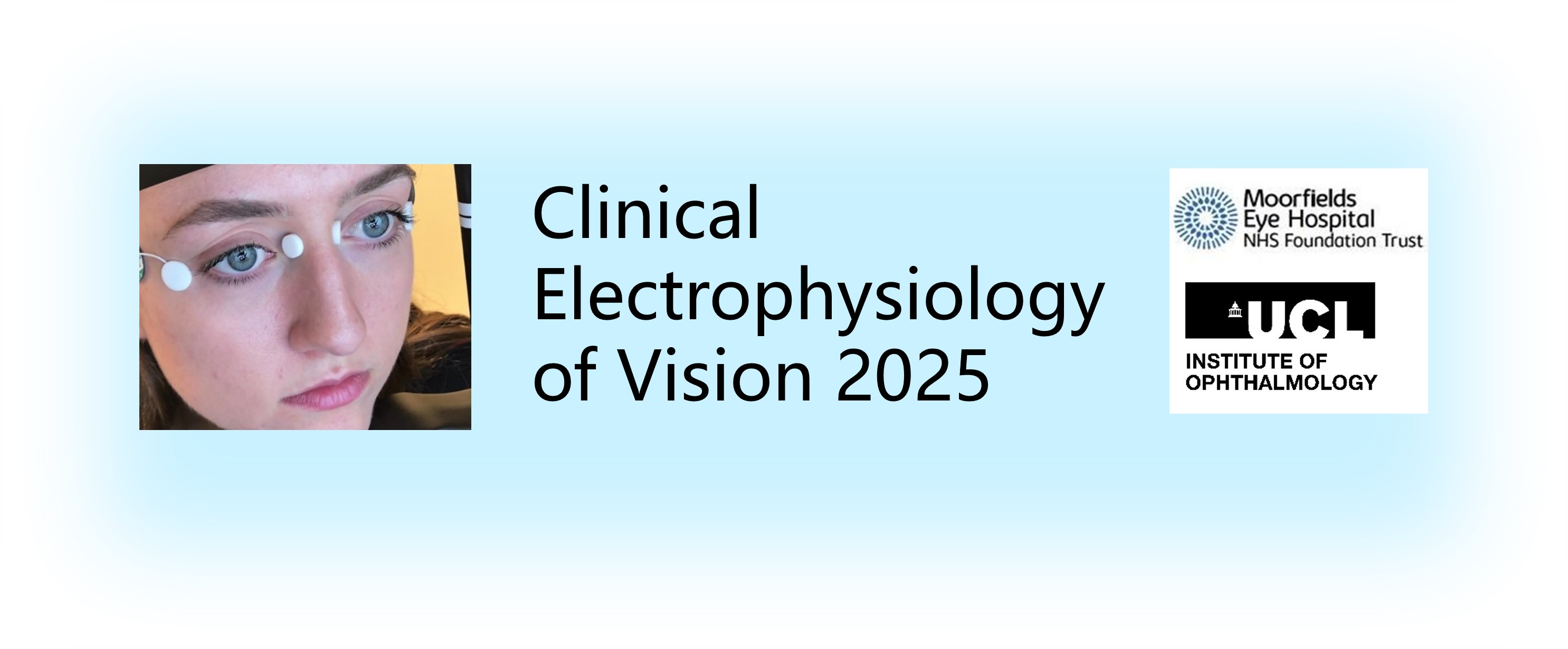Clinical electrophysiology of vision 2025
Bookings for our 2025 course are now closed. The 2026 coure will commence online from Tuesday 1st September. Dates for the live sessions are under discussion. Please join the waiting list to be notified when all dates are confirmed and bookings are open.
A highly sought after accredited virtual course delivered by world-renowned experts at Moorfields Eye Hospital and UCL Institute of Ophthalmology.
Course structure
This course will feature live on-line lectures by an international faculty, interactive question and answer sessions and case discussions. Pre-recorded introductory lectures will cover topics such as anatomy, ophthalmic imaging and the clinical characteristics of genetic and acquired eye disease.
The course is available online from Monday 01 September. Live lectures will take place on the following dates:
- Friday 12 September
- Saturday 13 September
- Friday 19 September
- Saturday 20 September
- Saturday 18 October (cases session)
Please click here to view the provisional agenda.
Please note that all live lecture sessions will be recorded on the day of the session and the recording will be shared at the earliest opportunity, so that it remains possible to participate in the course regardless of time zone and also to begin the course after the live lectures have taken place. The course materials will be available until 31 December 2025.
Optional practical day
The course also offers an optional practical day, to be held on-site at Moorfields Eye Hospital. You can choose to attend this either on Friday 24 October, Friday 07 November, or Friday 14 November, subject to availability of places.
In small groups you will watch practical demonstrations given by the Moorfields faculty and you will have an opportunity to undergo testing yourself, to experience electrophysiology from the patient's point of view. A maximum of 15 places are available per practical day. If you would like to attend, please make sure that you add this option to your cart, as well as the course itself, before checking out.
Who is this course for?
The course is intended for clinicians who wish to practice in the field or expand their knowledge, to basic and clinical scientists and other paramedics who have an interest in clinical vision science and to technicians and clinical physiologists working in ophthalmological or neurological electrodiagnostic units.
Featured topics
The main course will include live lectures on the theory and practice of clinical visual electrophysiology. There will be lectures on electroretinography (ERG), pattern ERG, multifocal ERG, cortical visual evoked potential (VEP), the electro-oculogram (EOG) and extended ERG protocols. Topics will be addressed in the context of clinical applications, including specialised paediatric techniques, in a wide range of retinal and visual pathway disorders.
Benefits of attending
- To understand the theory and practice of electrodiagnostic testing.
- To understand the diagnostic and clinical applications of different electrophysiological techniques including the full-field ERG, multifocal ERG, pattern ERG, EOG, VEP and ISCEV extended protocols.
- To interpret electrophysiological recordings in cases of inherited and acquired visual pathway and retinal disease.
- To understand structure-function and genotype-phenotype correlations.
- To understand the diagnostic value of electrophysiology in clinical practice.
CPD certification
CPD points and a certificate of attendance will be awarded at the end of the course.
Requirement
In order to access the programme online, you will need access to a computer (laptop or desktop) with a webcam and microphone. You will also need access to a free zoom account and a stable broadband connection. We also strongly recommend that you access the programme in a quiet environment.
Course organiser: Dr Anthony G. Robson (Moorfields Eye Hospital/UCL).
Co-organiser: Dr Magella Neveu (Moorfields Eye Hospital).
Faculty includes: Prof Michael Bach, Dr Antonio Calcagni, Dr Anne Georgiou, Dr Ruth Hamilton, Prof Michael Hoffmann, Prof Bart LeRoy, Prof Omar Mahroo, Dr Magella Neveu, Dr Anthony Robson, Dr Dorothy Thompson, Dr Patrick Yu Wai Man, Mr Shaun Leo.
Important booking note
This course is hosted on UCL's learning platform, called UCLeXtend. The process of enroling you on the course is a manual one and so there may be a delay between the point of purchase and receipt of the link to access the course. This will especially be the case if you make your purchase outside of UK office hours. The link will be shared as soon as possible after your purchase. Please don't hesitate to get in touch with any queries.

